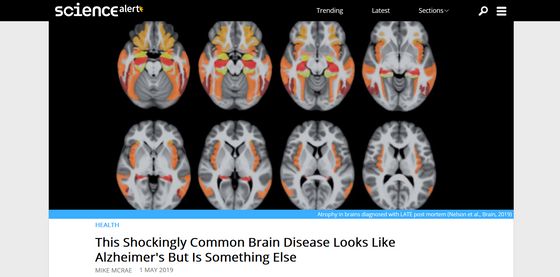Many of the patients diagnosed with Alzheimer's disease are likely to be LATE, when a new type of dementia 'LATE' is discovered

Researchers with dementia have discovered a new late-onset dementia that has never been discovered. Because this type of dementia called ' Cerbial Dominant Predominant Geriatric TDP-43 Encephalopathy (LATE) ' has the same symptoms as Alzheimer's disease, many of the patients diagnosed with Alzheimer's disease actually have It has also been pointed out that it may be LATE rather than disease.
Limbic-predominant age-related TDP-43 encephalopathy (LATE): consensus working group report | Brain | Oxford Academic
Form of dementia that 'mimics' Alzheimer's symptoms discovered | Society | The Guardian
https://www.theguardian.com/society/2019/apr/30/dementia-mimics-alzheimers-late-symptoms-discovered
This Shockingly Common Brain Disease Looks Like Alzheimer's But Is Something Else
https://www.sciencealert.com/some-diagnoses-of-alzheimer-s-disease-might-be-a-totally-different-type-of-dementia

A paper published in the medical journal '
For patients with symptoms of Alzheimer's disease but no accumulation of amyloid beta protein, researchers found that the accumulation of a protein called TDP-43 caused cognitive impairment. It is said that excessive accumulation of TDP-43 impairs cognition, and 20 to 50% of elderly people aged 80 and over have accumulated TDP-43 so that cognition is impaired.
This type of dementia, named LATE, seems to have almost the same symptoms as Alzheimer's disease, but the progression of the condition is not as rapid as Alzheimer's disease. Robert Howard, a geriatric psychiatric professor at University College London , points out that the paper presented this time may be the most important one in the last five years. Among the patients diagnosed with Alzheimer's disease, it is said that the mystery of having a patient whose disease progression is not as fast as normal Alzheimer's disease has finally been elucidated.

by
“With recent research, Nina Silverberg, director of the Alzheimer's Disease Research Program at the National Aging Institute , says that not all patients previously thought to have Alzheimer's disease have Alzheimer's disease, other than Alzheimer's disease. It has been suggested that it is very important to understand the disease.
Since Alzheimer's disease and LATE have almost the same symptoms except for the speed of progression, but the causative agent is different, an effective treatment for Alzheimer's disease is not effective for LATE, and an effective treatment for LATE is Alzheimer's disease. May not be valid for Despite many years of research, the failure to establish a diagnosis or treatment for Alzheimer's disease may be due to confusion between patients with LATE and patients with Alzheimer's disease. .
At the time of writing, because it is necessary to examine brain tissue to distinguish LATE and Alzheimer's disease, it is difficult to distinguish them other than post mortem. In addition, there is also a pattern in which LATE and Alzheimer's disease co-exist, and it seems that the discovery of LATE does not immediately bring about any major change in medical practice.

by rawpixel.com
In the future, researchers will work to find biomarkers to distinguish between LATE and Alzheimer's disease in living patients. If two diseases can be identified, it is expected that there will be great progress in the treatment of dementia including Alzheimer's disease.
Related Posts:
in Science, Posted by log1h_ik







